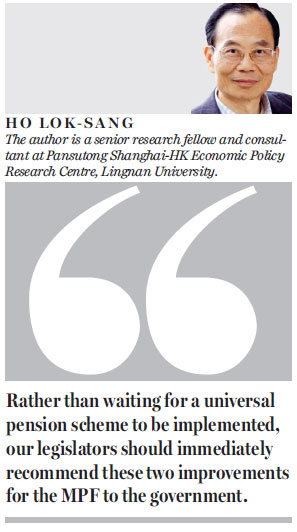The elderly need income security
Updated: 2015-07-21 11:41
By Ho Lok-sang(HK Edition)
|
|||||||
Ho Lok-sang argues that there are two simple improvements that can be made to the MPF to materially boost the well-being of Hong Kong's senior citizens
The Chinese University of Hong Kong Jockey Club Institute of Aging ranked Hong Kong 24th overall in the well-being of elderly people among 97 countries or territories in 2014. This is a notable achievement. However, Hong Kong ranked only 75th in income security. After the release of a study by Professor Chow Wing-sun of the University of Hong Kong last year, many hoped that the problem of elderly people's income security would be addressed. Unfortunately, the controversy continues, and Professor Chow failed to address the concerns over the sustainability of his proposed pension scheme.
Economists have long pointed out that a "pay-as-you-go" scheme is subject to the vagaries of uncertain demographic trends. To address this concern I have designed a cohort-based universal pension scheme and have answered queries from all sides. I have no idea what stopped Professor Chow from submitting it as a viable and sustainable option to the government. To put it simply, the cohort-based pension scheme is just a Mandatory Provident Fund (MPF) shared by a cohort, or group, which allows its members to draw a standard stipend for as long as they live. Because the life expectancy of a cohort can be reasonably gauged, there is little difficulty in working out how much of a contribution is needed for any desired monthly pension, if we have a known minimum rate of return.
A cohort-based public pension plan is perhaps a long shot. But there are two things that can be done now, which will improve the MPF and the income security of elderly people considerably.
First is a guaranteed minimum rate of return for all MPF plans. I would suggest a 2 percent real rate of return guarantee. My proposal is that if any member of an MPF plan enjoys more than 2 percent real rate of return, i.e., nominal rate of return minus the rate of consumer price index (CPI) inflation, the government will take away half of the excess return and put it into a rate of return stabilization fund. If any member's rate of return falls short of the guaranteed rate, the shortfall will be made up through an injection from the stabilization fund.
There is, of course, no guarantee that the "tax on excess returns" will definitely cover the shortfalls over the years. However, given the historical performance of financial markets over the long term, the chances are good, and any remaining shortfall can be made up for through the general revenue.
My second suggestion to improve the MPF relates to the fact that, at present, those whose monthly income is less than HK$7,100 do not have to make the 5 percent contribution which others have to. Low-income earners are the most vulnerable group that an MPF plan is supposed to benefit. So why should employers' contributions alone suffice for their financial needs? There is a strong case for subsidizing the contributions of low-income earners totally or in part.
There will be a technical problem that needs to be addressed. If we draw a line, say, HK$7,100, below which contributions are completely funded by the general revenue while those who make incomes above this threshold will have to pay 5 percent, it would be better off for the workers earning somewhat more than HK$7,100 if their employers pay them somewhat less. And employers would happily pay them less because that would reduce their costs.
In order to deal with this technical problem I would refer to my proposal for graduated subsidies that I had discussed before. If contributions are to be completely exempted for incomes below HK$7,100, I would argue that partial subsidies should be available for those who make more than this. These subsidies should taper off as incomes rise, and would become zero, say, when they reached HK$10,000.
Rather than waiting for a universal pension scheme to be implemented, our legislators should immediately recommend these two improvements for the MPF to the government.
Chief Executive Leung Chun-ying has rightly proposed putting aside controversial political issues and instead focusing on the economy and livelihood issues. If we are concerned about the well-being of our elderly and our workers, we should not let political inclinations divide us. We should all consider whether a particular policy works. If it does not, what else does? We need to put our minds together and do what is good for Hong Kong. This is the renaissance our city badly needs - a culture of consideration for others. Our legislators especially should set a good example for the younger generation by putting aside personal differences.
I do not see much controversy in these proposals. They should be entirely affordable for Hong Kong. If they help build solidarity and social harmony, their benefits will go far beyond helping the elderly.

(HK Edition 07/21/2015 page9)